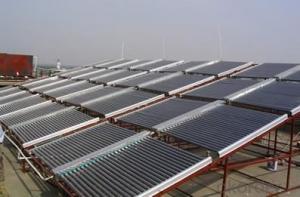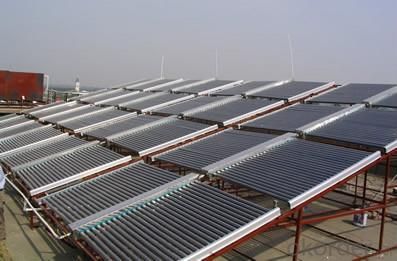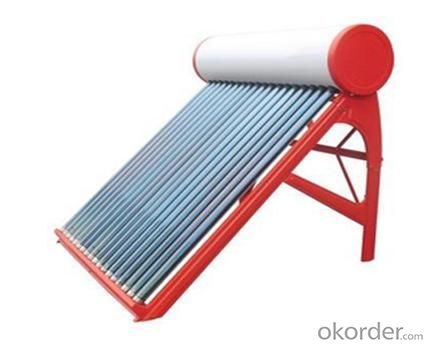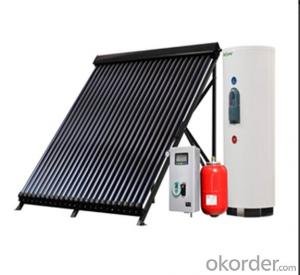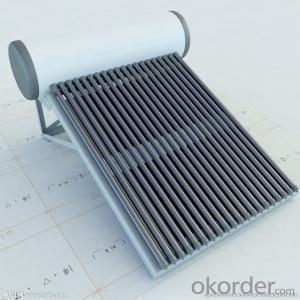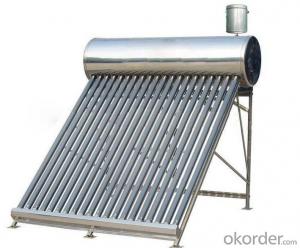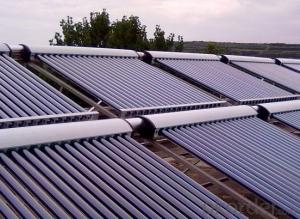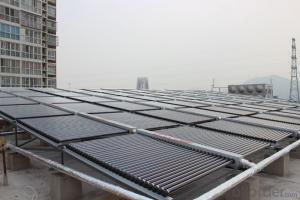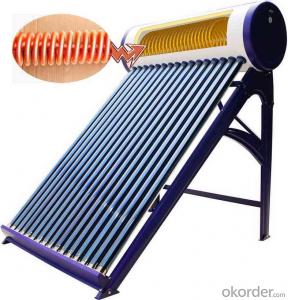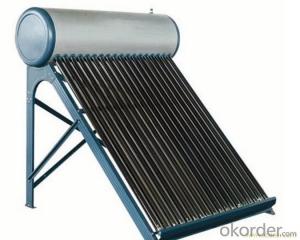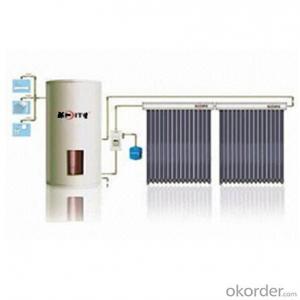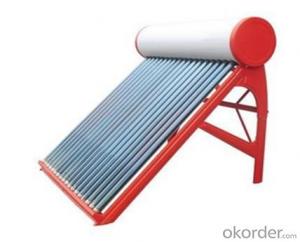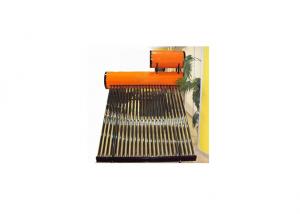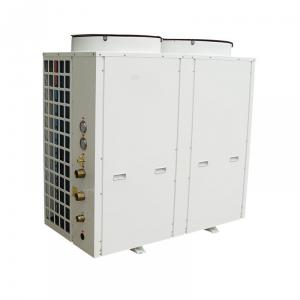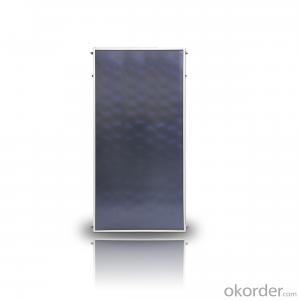Foset Solar Water Heater with Copper Coil in Water Tank
- Loading Port:
- China main port
- Payment Terms:
- TT OR LC
- Min Order Qty:
- 1 set
- Supply Capability:
- 6000 set/month
OKorder Service Pledge
OKorder Financial Service
You Might Also Like
Introduction of Non-Pressure Solar Water Heater:
Non-pressure Solar Heater is one of the most economical solar water heating device with pretty high efficiency at the same time. It consists of hot water storage tank, solar vacuum tubes with mouth plug in storage tank, and bracket supporting tank and tubes.When cold water in evacuated tubes is heated with solar irradiation, as the specific gravities of hot water and cold water are different, hotter water goes upward to storage tank and colder water goes downward to glass tubes. through this continuous circulation, the cold water in storage tank will be gradually heated till sunset.
Specialty:
1. High thermal performance and working temperature: the heat exchanging rate even in winter can up above 55%.
2. Heat collecting efficiency is at least 20% above common solar systems.
3. Work in all day and all season: no matter any corner of the world, this system can work well even -40℃ to avoid the tube freezing problem.
4. Reliability: No water following through the tube, so water scale can not generate and tube cracks could be avoided, the system still can keep working even with some damaged tubes.
5. It can connect with water tap and work automatically with pressure0.6Mpa, bring enjoyable washing experience.
6. Safety: P/T valve would release pressure and temperature to protect tank..
Technical Specification:
1. Outer tank material: SUS304 stainless steel or powder coated color steel
2. Inner tank material: 1.2mm thick SUS304 food grade stainless steel ( Optional material SUS316L)
3. Vacuum tube material: borosilicate glass 3.3; AL-SS-CU absorb coating, with copper heat pipe inside
4. Frame material: 1.2mm thickness stainless steel
5. Insulation material: 55mm thickness polyurethane
6. Suitable for mains pressure water(up to 8 bar/116psi)
7. Easy plug-in installation
8. Install the T/P valve on the pressurized tank
9. Seal material: Stabilized High Temperature Silicon
Outer tank material: SUS304 stainless steel or powder coated color steel
Inner tank material: 1.2mm thick SUS304 food grade stainless steel ( Optional material SUS316L)
Vacuum tube material: borosilicate glass 3.3; AL-SS-CU absorb coating, with copper heat pipe inside
Frame material: 1.2mm thickness stainless steel
Insulation material: 55mm thickness polyurethane
Suitable for mains pressure water(up to 8 bar/116psi)
Easy plug-in installation
Install the T/P valve on the pressurized tank
Seal material: Stabilized High Temperature Silicon
19. Vacuum Tube | 20. Size (mm) | 21. Φ47*1500 / Φ58*1800 / Φ70*2100 | |||||
22. Tube (pcs) | 23. 10 / 12 / 15 / 18 / 20 / 22 / 24 / 30 / 36 / 42 | ||||||
24. Material | 25. Borosilicate 3.3 glass, magnetron spluttering selective coating | ||||||
26. Coating | 27. Single-target AL-N/AL or Three-target AL/N-Cu-SS | ||||||
28. Water Tank | 29. Capacity | 30. 80L ~ 500L for hot water storage tank | |||||
31. Inner tank | 32. Food-grade stainless steel SUS304-2B / SUS316 | ||||||
33. Insulation | 34. High-density polyurethane foam with 70~80 hour heat preservation | ||||||
35. Tank shell | 36. Food-grade stainless steel SUS304-2B | ||||||
37. Bracket | 38. Shaped strong aluminum alloy structure adaptable for flat or slope roof | ||||||
39. Accessories | 40. Anti-aging silicon seals, Dustproof seals, Air-vent cap, Stainless screws | ||||||
41. Auxiliary Devices | 42. Assistant tank, Intelligent controller, Electrical heater, Magnesium anodes | ||||||
43. Tilt Angle | 44. 25 ~ 50° | ||||||
45. Water Output | 46. 45 - 95°C | ||||||
47. Hail Resistance | 48. Φ25mm diameter | ||||||
49. Model Number | 50. Solar Vacuum Tube | 51. Tank 52. Liter | 53. System 54. Liter | 55. Container Loading Qty /sets | |||
56. Size /mm | 57. Qty /pcs | 58. 20GP | 59. 40GP | 60. 40HQ | |||
61. VNS-58SA12-100 | 62. Φ58*1800 | 63. 12 | 64. 100 | 65. 132 | 66. 58 | 67. 119 | 68. 140 |
69. VNS-58SA15-130 | 70. 15 | 71. 130 | 72. 170 | 73. 54 | 74. 108 | 75. 131 | |
76. VNS-58SA18-150 | 77. 18 | 78. 150 | 79. 198 | 80. 43 | 81. 86 | 82. 105 | |
83. VNS-58SA20-170 | 84. 20 | 85. 170 | 86. 223 | 87. 40 | 88. 80 | 89. 97 | |
VNS-58SA24-200 | 24 | 200 | 263 | 35 | 70 | 85 | |
VNS-58SA30-250 | 30 | 250 | 329 | 28 | 56 | 68 | |
VNS-58SA36-300 | 36 | 300 | 395 | 23 | 47 | 57 | |
Products Show
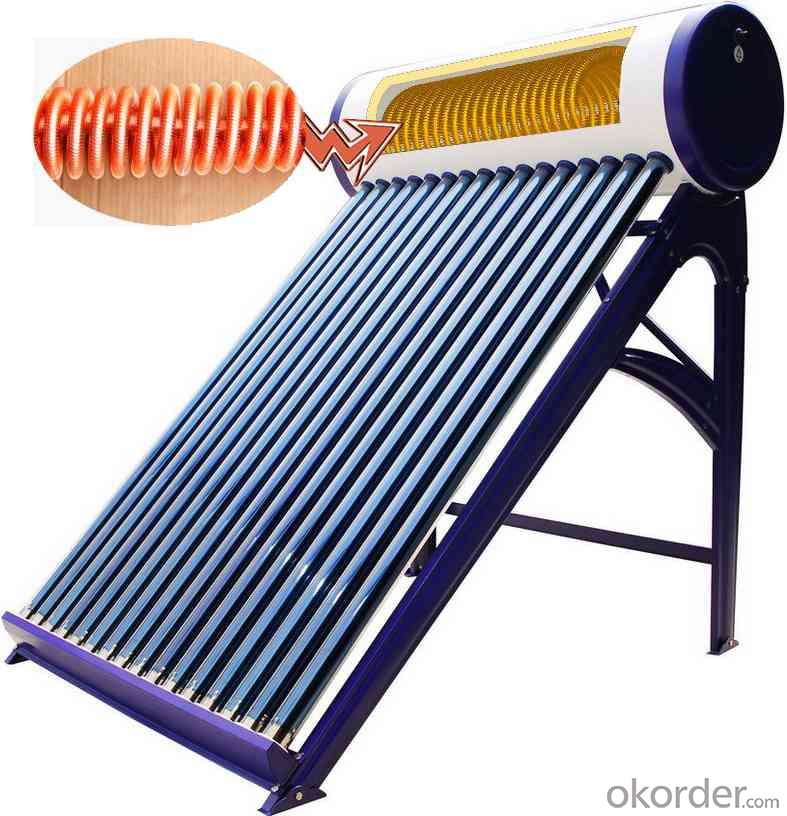
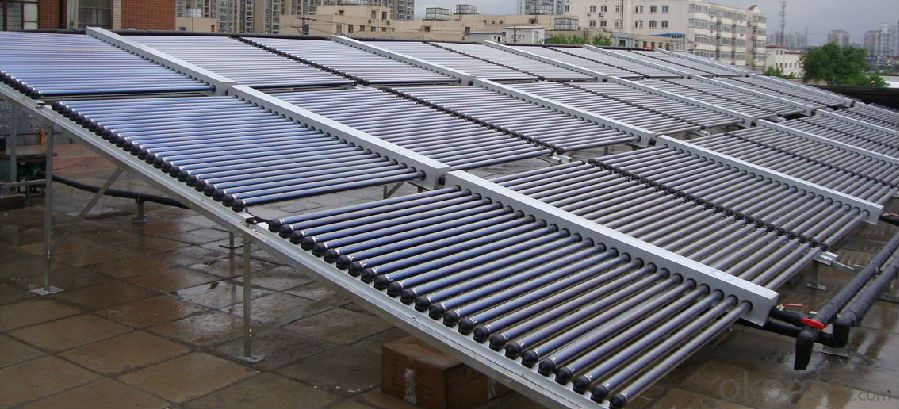
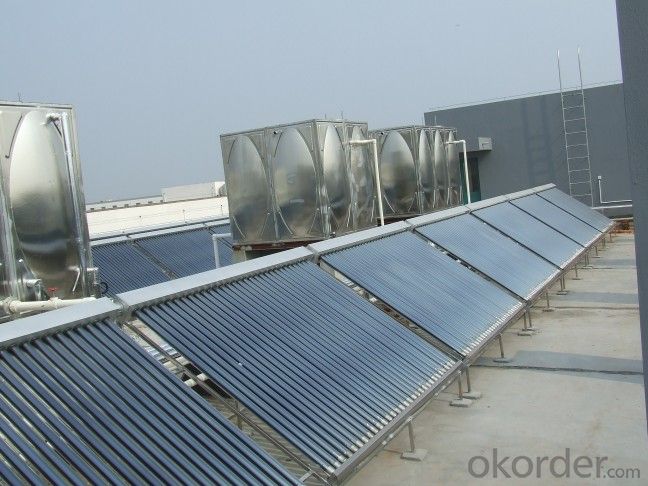
Our Services
1. OEM service
2. Warranty: 5 years
3. Considerable after sale service
Color steel Compact pressure Thermal solar heater
FAQ:
1. What’s the delivery time?
10 days after receiving deposit.
2. How long is the warranty?
5 years for whole system, 1 year for accessory
3. What’s your production capacity?
6000sets/month
4. What’s the MOQ?
1 set.
5. What’s your payment term?
Container: 30% T/T in advance for deposit, 70% T/T before shipment for fist order.
70% T/T after seeing copy of B/L from second order
Sample: 100% T/T in advance
Other choices: L/C at sight.
6. What certifications do you have?
CE, SOLAR KEYMARK, SRCC and etc.
- Q: Can a solar water heater be installed on a rooftop with limited sun exposure?
- While a solar water heater requires ample sunlight to function optimally, it may still be possible to install one on a rooftop with limited sun exposure. However, the efficiency and effectiveness of the system may be significantly reduced. It is crucial to assess the available sunlight and consult with professionals to determine the feasibility and potential drawbacks of installation in such conditions.
- Q: Can a solar water heater be used in areas with limited hydroelectric resources?
- Areas with limited hydroelectric resources can indeed use solar water heaters. Unlike hydroelectric power, solar water heaters rely on the energy from the sun to heat water. Therefore, they are not reliant on hydroelectric resources. As long as there is sufficient sunlight, solar water heaters can efficiently heat water without the need for hydroelectric power. This renders solar water heaters a feasible and sustainable choice for areas with limited access to hydroelectric power. Moreover, solar water heaters are eco-friendly and can aid in reducing dependence on non-renewable energy sources, making them an excellent alternative for regions with limited hydroelectric resources.
- Q: What are the components of a solar water heater system?
- The components of a solar water heater system typically include solar collectors, a storage tank, a heat transfer fluid, a circulation pump, and a control system.
- Q: How does the distance between the solar panels and the storage tank affect the performance of a solar water heater?
- The distance between the solar panels and the storage tank can affect the performance of a solar water heater. A shorter distance allows for less heat loss during the transfer of hot water from the panels to the tank, resulting in higher efficiency and faster heating. On the other hand, a longer distance may lead to more heat loss, potentially reducing the overall performance and efficiency of the system.
- Q: What is the storage capacity of a typical solar water heater?
- The storage capacity of a typical solar water heater can vary depending on the size and model. However, most residential solar water heaters have storage tanks with capacities ranging from 40 to 120 gallons. Commercial or larger-scale solar water heaters may have even larger storage capacities. It's important to note that the storage capacity determines the amount of hot water that can be stored and used during periods when solar energy is not available, such as at night or on cloudy days.
- Q: How does the orientation of the solar collector affect the performance of a solar water heater?
- The orientation of the solar collector significantly affects the performance of a solar water heater. The collector should ideally be facing south (in the northern hemisphere) or north (in the southern hemisphere) to receive maximum sunlight exposure throughout the day. This orientation allows for optimal absorption of solar radiation and thus increases the heating efficiency of the water heater. A well-aligned collector can capture more sunlight, resulting in higher water temperatures and improved overall performance of the system.
- Q: What is the average cost of maintenance for a solar water heater?
- The average cost of maintenance for a solar water heater can vary depending on various factors such as the type of system, its age, and the specific maintenance requirements. However, on average, homeowners can expect to spend around $100 to $300 per year on maintenance for a solar water heater. This includes routine inspections, cleaning, and occasional repairs or replacements of components such as pumps or valves. It is important to note that proper maintenance is crucial for maximizing the system's efficiency and lifespan.
- Q: How does a solar water heater impact water quality?
- A solar water heater generally has a positive impact on water quality. By harnessing the sun's energy, it heats water without the need for fossil fuels or electricity, thereby reducing pollution. Solar water heaters also typically have a lower risk of corrosion, scale build-up, or contamination compared to traditional water heaters, leading to cleaner and healthier water.
- Q: Can a solar water heater be used in areas with limited access to reliable weather forecasting or solar radiation data?
- Yes, a solar water heater can still be used in areas with limited access to reliable weather forecasting or solar radiation data. While having access to accurate weather forecasting and solar radiation data can help optimize the performance of a solar water heater, it is not a requirement for its basic functionality. Solar water heaters can still effectively use available sunlight to heat water even without precise data. The design and sizing of the system can be based on general solar radiation estimates for the region, and adjustments can be made based on observations and experience over time. Additionally, solar water heaters often have backup heating systems, such as electric or gas heaters, which can be used during periods of low solar radiation or inclement weather.
- Q: Can a solar water heater be used in areas with limited access to environmental impact assessments?
- Yes, a solar water heater can be used in areas with limited access to environmental impact assessments. Solar water heaters are a sustainable and environmentally friendly option for heating water as they utilize energy from the sun. Since they do not rely on fossil fuels, their environmental impact is significantly lower compared to conventional water heating methods. However, it is still essential to ensure that the installation of solar water heaters complies with local safety regulations and guidelines to avoid any potential negative impacts on the environment or surrounding communities.
Send your message to us
Foset Solar Water Heater with Copper Coil in Water Tank
- Loading Port:
- China main port
- Payment Terms:
- TT OR LC
- Min Order Qty:
- 1 set
- Supply Capability:
- 6000 set/month
OKorder Service Pledge
OKorder Financial Service
Similar products
Hot products
Hot Searches
Related keywords
